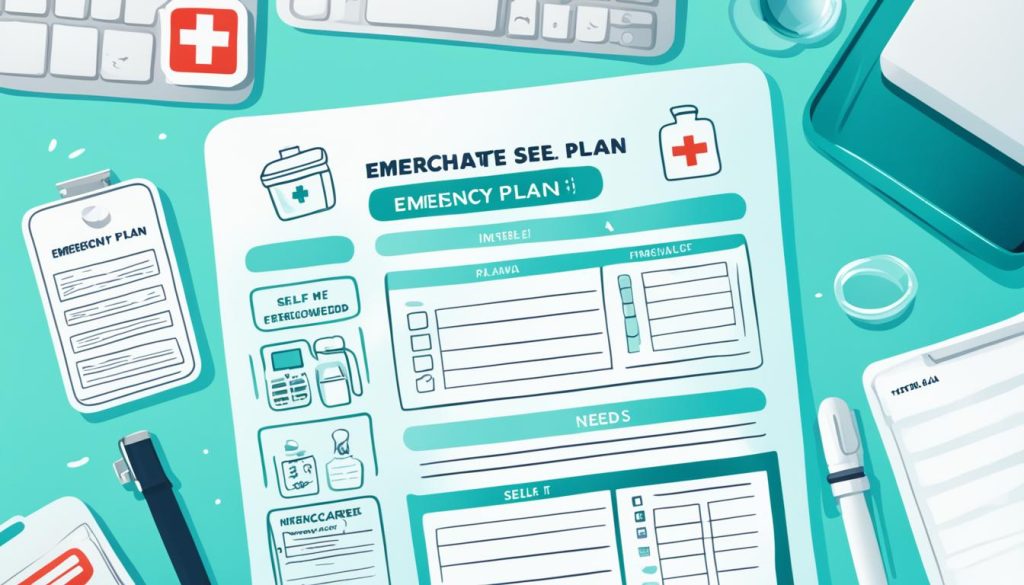Welcome to my guide on crafting an effective self-care plan! In today’s fast-paced world, it’s important to prioritize our well-being and find strategies to manage stress. A self-care plan is like a personal roadmap that helps us navigate the journey towards wellness. By creating and following a customized plan, we can cultivate healthy habits, nurture our mental health, and find balance in our lives.
Creating an effective self-care plan involves several key steps. First, you’ll assess your current self-care practices to identify what’s working well and areas where you can make improvements. Then, you’ll start incorporating new self-care practices into your routine while eliminating any obstacles that may hinder your progress. You’ll also develop an emergency self-care plan to navigate challenging situations.
By making a personal commitment to self-care and sharing your plan with others, you’ll gain support and encouragement along the way. Remember, self-care is a continuous process, and your plan may evolve as your needs change. So let’s dive in and discover the strategies that will help you craft an effective self-care plan!
Key Takeaways:
- Creating a self-care plan is essential for nurturing your well-being and managing stress.
- Assess your current self-care practices to identify what’s working well and areas for improvement.
- Incorporate new self-care practices into your routine and eliminate obstacles that may hinder your progress.
- Develop an emergency self-care plan to prioritize your well-being in challenging situations.
- Make a personal commitment to self-care and share your plan with others for added support.
Assessing Your Current Self-Care Practices
To create an effective self-care plan, it’s important to assess your current self-care practices. It’s time to reflect on how you currently take care of yourself and where there is room for improvement. By evaluating your coping strategies and identifying the impact they have on your well-being, you can make informed decisions about what changes you need to make.
Start by conducting a self-care assessment to gain clarity on the good things you are already doing for yourself. This assessment will also help you identify the areas where you may need to incorporate or enhance self-care practices. Take into account the different domains of self-care – physical, psychological, emotional, spiritual, and relationships – and make a note of the practices that align with each domain. This evaluation will guide you to create a comprehensive self-care plan that addresses your specific needs.
Consider the following questions as you assess your current self-care practices:
- What coping strategies do you currently rely on to manage stress?
- How effective are these coping strategies in supporting your overall well-being?
- Are there any self-care domains that you tend to neglect?
- Do your current lifestyle behaviors align with your self-care goals?
Take the time to genuinely reflect on each question and answer them honestly. This self-assessment will provide you with valuable insights and serve as a foundation for developing a personalized self-care plan that caters to your unique needs.
“The first step toward change is awareness. The second step is acceptance.” – Nathaniel Branden
Maintenance Self-Care and Overcoming Obstacles

Maintenance self-care plays a crucial role in nurturing our well-being and ensuring long-term self-care success. It involves regularly engaging in self-care activities that we have identified as important to our overall health and happiness.
Adding these practices to our self-care routine is essential, but we may encounter barriers that hinder our ability to implement and maintain them. Identifying and addressing these obstacles is key to overcoming them and staying committed to our self-care plan.
Identifying New Self-Care Activities
One way to ensure we continue engaging in maintenance self-care is by periodically identifying new activities to add to our routine. These activities can help enhance our self-care practices and provide variety, preventing boredom and monotony.
Use the My Maintenance Self-Care Worksheet to brainstorm and jot down new self-care ideas that align with your interests and goals. Explore different domains of self-care, such as physical, mental, emotional, spiritual, and social, to ensure a comprehensive approach.
Addressing Barriers to Self-Care
Barriers to self-care can be internal or external factors that prevent us from engaging in activities that promote our well-being. It’s essential to identify and address these barriers to ensure our self-care practices are not compromised.
Reflect on potential barriers you may face, such as lack of time, resources, or motivation, and think of practical solutions to overcome them. This may involve rearranging your schedule, seeking support from loved ones, or finding alternative ways to incorporate self-care into your daily life.
Staying Accountable to Your Self-Care Plan
“Self-care is a continuous process, and our commitment to it determines our success.”
Remind yourself regularly to follow your self-care plan and prioritize your well-being. Accountability is crucial when it comes to maintenance self-care. Stay committed to the activities you have identified as essential, even when faced with challenges or competing demands.
Tracking your progress can also help you stay accountable. Keep a journal or use a tracking app to record your engagement in self-care activities and reflect on their impact on your well-being.
Revising Your Self-Care Plan
Recognize that self-care is a dynamic process, and your needs may change over time. Your self-care plan should be flexible and open to revisions as necessary.
Regularly evaluate your self-care practices, reassess your goals, and make adjustments to your routine accordingly. Embrace self-reflection and be open to exploring new self-care activities that align better with your current needs and circumstances.
Remember that maintenance self-care is an ongoing journey, and it’s important to prioritize your well-being consistently.
Creating an Emergency Self-Care Plan

While maintenance self-care is essential for your overall well-being, it’s equally important to have an emergency self-care plan in place. This plan serves as a guide for prioritizing your well-being in extremely challenging situations. By anticipating potential crisis scenarios and preparing yourself mentally, emotionally, and physically, you can navigate difficult circumstances more effectively.
To create your emergency self-care plan, use the Emergency Self-Care Worksheet below:
Emergency Self-Care Worksheet
- Identify potential crisis scenarios that you may encounter in difficult circumstances.
- Think about the specific self-care actions you can take to support yourself during each crisis scenario.
- Consider how you can prepare yourself mentally, emotionally, and physically to handle these situations.
Remember, an emergency self-care plan is designed to provide you with strategies and resources to prioritize your well-being when facing significant challenges.
Having an emergency self-care plan in place can help you stay grounded and make self-care a priority even in difficult times. By proactively preparing for potential crisis situations, you empower yourself to navigate them with resilience and emerge stronger.
Making a Personal Commitment to Self-Care
When it comes to self-care, it’s not just about creating a plan – it’s about making a personal commitment to prioritize your own well-being.
Take a moment to reflect on any reservations you may have and any tendencies to put others’ needs before your own. Recognize that self-care is not selfish; it is necessary for your overall well-being and success in both your personal and professional life. By investing in your self-care, you are setting yourself up for success.
Preparing a self-care plan is an important step, but it is your commitment to follow through with that plan that truly determines its success. It’s easy to make excuses or let other responsibilities take precedence, but remember that you can’t pour from an empty cup. Prioritizing your own needs allows you to show up fully for others.
“Self-care is giving the world the best of you, instead of what’s left of you.”
Consider joining a support group or starting one yourself. Surrounding yourself with like-minded individuals who also prioritize their self-care can provide you with valuable support, inspiration, and accountability. These groups can serve as a safe space to exchange self-care ideas and strategies, as well as to share the challenges and victories along your self-care journey.
Remember, making a personal commitment to self-care is an ongoing process. It requires conscious effort, dedication, and sometimes even the courage to say “no” to others in order to say “yes” to yourself. By investing time and energy into your own well-being, you are setting the foundation for a more balanced, fulfilling, and successful life.
| Benefits of Making a Personal Commitment to Self-Care |
|---|
| Improved physical and mental health |
| Increased energy and productivity |
| Reduced stress and anxiety |
| Enhanced resilience and coping skills |
| Stronger relationships and better communication |
| Growth and personal development |
By making a personal commitment to self-care, you are investing in your own well-being and setting the stage for success in all areas of your life. Prioritize yourself, join a support group, and make self-care a non-negotiable part of your daily routine.
Sharing Your Self-Care Plan
Once you have developed your self-care plan and made a personal commitment, it’s important to share it with others. Sharing your self-care plan can provide you with a support system and create a sense of community. Friends, family, peers, and colleagues can serve as additional resources for exchanging self-care ideas and strategies, offering support and encouragement along the way.
You may also consider joining or starting a support or discussion group where you can engage with like-minded individuals who are on a similar self-care journey. These groups provide a safe and non-judgmental space to share experiences, gain insights, and discover new self-care ideas. Connecting with others who value self-care can foster a sense of belonging and accountability, motivating you to stay committed to your self-care plan.
Benefits of Sharing Your Self-Care Plan
Sharing your self-care plan offers various benefits:
- **Support System**: Having a support system can make the journey of self-care feel less overwhelming. It enables you to lean on others during challenging times and share in each other’s successes.
- **Exchange of Ideas**: When you share your self-care plan, you open yourself up to a world of new ideas and perspectives. Others may provide valuable suggestions and insights that can enhance your self-care practices.
- **Accountability**: Sharing your self-care plan helps create a sense of accountability. When others are aware of your plan, they can hold you responsible for following through on your commitments.
- **Encouragement and Motivation**: The support and encouragement from others can motivate you to stay consistent with your self-care routines. It reinforces the idea that self-care is important and validates your efforts.
- **Inspiration**: Seeing others share their self-care plans can inspire you to explore new self-care practices and incorporate them into your own plan. It can also provide reassurance that you are not alone in your self-care journey.
By sharing your self-care plan, you create a network of support and encouragement that can help you maintain and strengthen your commitment to self-care.
Remember, self-care is not a solo journey. It’s about creating connections and finding comfort in the shared experiences and insights of others.
My Self-Care Support Group
| Name | Role/Relationship |
|---|---|
| Emily | Best friend |
| David | Colleague |
| Sarah | Fitness buddy |
| Michael | Family member |
I have also joined a support group called “Self-Care Warriors” where we share self-care ideas, stories, and challenges. Together, we create a supportive and nurturing environment that encourages each other’s well-being.
Remember, sharing your self-care journey not only allows you to receive support and encouragement but also enables you to inspire and uplift others along their self-care paths.
Implementing and Tracking Your Self-Care Plan
With your self-care plan in place, it’s time to put it into action and track your progress. By implementing your plan and monitoring how you’re doing, you can ensure that you’re on the path to self-care success. Keeping a record of your journey allows you to identify and celebrate your achievements while also addressing any challenges that may arise.
Implementing Your Self-Care Plan
Implementing your self-care plan involves consistently practicing the self-care activities and strategies you’ve identified. It’s important to prioritize your well-being and make time for self-care amidst your daily responsibilities. Whether it’s taking breaks to recharge, scheduling regular exercise, or practicing mindfulness, fully committing to your plan will contribute to its effectiveness.
Remember to refer to your emergency self-care plan in times of need. During difficult circumstances, your emergency plan will guide you in prioritizing your well-being and maintaining your self-care routine. Following this plan ensures that you have strategies in place to navigate challenging situations and safeguard your mental and emotional health.
Tracking Your Progress
Tracking your progress is an essential part of implementing your self-care plan. By regularly assessing how you are doing, you can gain insights into the effectiveness of your chosen activities and make necessary adjustments. Tracking your progress also helps you stay motivated, as you can see the positive impact your self-care practices are having on your overall well-being.
You can track your progress in various ways, such as keeping a journal, using a mobile app, or creating a checklist. Choose a method that works best for you and allows you to easily monitor and evaluate your self-care journey. Reflect on how your self-care practices make you feel, note any improvements in your mental and physical health, and celebrate your accomplishments along the way.
Revising Your Self-Care Plan
A self-care plan is not set in stone—it should be adaptable to your changing needs and circumstances. Regularly revisiting and revising your plan is crucial for its continued effectiveness. As you navigate different personal and professional demands, you may find that certain activities need to be modified or new practices should be incorporated.
Revising your self-care plan allows you to fine-tune your strategies and ensure that they continue to support your well-being. Reflect on your progress, assess the impact of your activities, and identify areas where adjustments are needed. By being flexible and open to change, you can optimize your self-care plan and continue to prioritize your overall well-being.
Conclusion
Creating an effective self-care plan is essential for nurturing your well-being and managing stress. By prioritizing self-care and committing to a comprehensive plan, you can reap numerous benefits and maintain a healthy and balanced life.
A well-crafted self-care plan improves your mental health and well-being, allowing you to better manage stress and anxiety. It also helps prevent illness by promoting healthy habits and self-care practices. Taking care of yourself physically, mentally, emotionally, spiritually, and professionally contributes to your overall well-being and resilience.
Implementing and sticking to your self-care plan enhances productivity, as it ensures that you are operating at your best. By taking intentional breaks, engaging in activities that recharge and rejuvenate you, and addressing your holistic needs, you are better equipped to perform at your peak potential.
Moreover, a self-care plan strengthens personal relationships by fostering a healthy work-life balance and enabling you to show up fully present for your loved ones. Prioritizing your own needs and creating boundaries can help you maintain healthier relationships and cultivate deeper connections.
To maximize the benefits of your self-care plan, remember to regularly evaluate and adjust it as needed. Share your plan with supportive individuals who can encourage and hold you accountable. By nurturing your well-being through self-care, you invest in yourself, allowing you to lead a more fulfilling and balanced life.
FAQ
What is a self-care plan?
A self-care plan is like a roadmap for nurturing your well-being and managing stress. It involves identifying current coping strategies and self-care practices, adding new self-care practices, eliminating obstacles, and creating an emergency self-care plan.
How do I assess my current self-care practices?
To assess your current self-care practices, identify your coping strategies and evaluate their impact on your well-being. Consider each domain of self-care – physical, psychological, emotional, spiritual, and relationships – and make notes on the practices you would like to incorporate.
What is maintenance self-care?
Maintenance self-care refers to the activities that you have identified as important for your well-being and commit to engaging in regularly. It’s important to add these practices to your self-care routine and eliminate any obstacles that may hinder your ability to implement and maintain them.
How do I create an emergency self-care plan?
To create an emergency self-care plan, consider potential crisis scenarios and think about how you can prepare yourself mentally, emotionally, and physically. Having a plan in place can help you navigate difficult circumstances more effectively.
Why is making a personal commitment to self-care important?
Making a personal commitment to self-care is essential for its successful implementation. It is crucial for your well-being and effectiveness in meeting professional and personal commitments.
Should I share my self-care plan with others?
Sharing your self-care plan with friends, family, peers, and colleagues can provide additional resources and support. Consider joining or starting a support group to exchange self-care ideas and provide mutual support.
How do I implement and track my self-care plan?
Implement your self-care plan and track your progress to recognize your successes and address any difficulties. Regularly assess your progress and make necessary revisions as personal and professional demands change.
What are the benefits of having a self-care plan?
Creating an effective self-care plan improves mental health and well-being, helps manage stress and anxiety, prevents illness, enhances productivity, and strengthens personal relationships.

